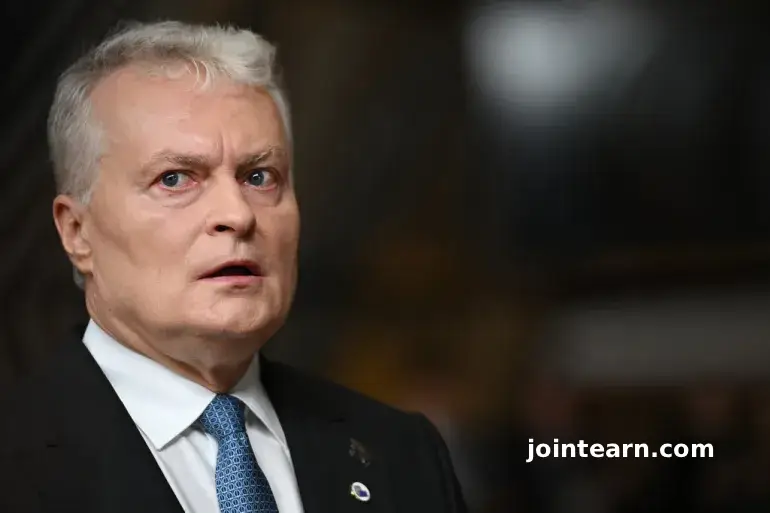
Vilnius, Lithuania — Lithuanian President Gitanas Nausėda has accused Russia of a “blatant breach” of international law after two Russian military aircraft briefly entered Lithuania’s airspace, escalating tensions along NATO’s eastern flank as the war in Ukraine continues to destabilize the region.
The incident, which occurred on Thursday evening, comes amid a string of drone incursions and airspace violations in Eastern Europe that Western leaders fear may be deliberate attempts by Moscow to test NATO’s readiness.
Russian Jets Cross Into Lithuanian Airspace
According to the Lithuanian Armed Forces, an Su-30 fighter jet and an Il-78 aerial refueling tanker flew approximately 700 meters (0.43 miles) into Lithuanian territory near the Kaliningrad border around 6 p.m. local time (15:00 GMT). The aircraft were reportedly conducting mid-air refueling exercises in the heavily militarized Russian exclave of Kaliningrad, which borders Lithuania and Poland.
Lithuanian radar systems detected the intrusion immediately, prompting the NATO Baltic Air Policing mission to scramble two Spanish Eurofighter Typhoon jets from the Šiauliai Air Base. The NATO jets patrolled the area until the Russian aircraft exited Lithuanian airspace.
“This is a blatant violation of Lithuania’s territorial integrity and a reckless provocation that endangers regional stability,” President Nausėda said on X (formerly Twitter). “We will summon Russia’s embassy representatives to deliver a formal protest.”
Moscow Denies Airspace Breach
The Russian Ministry of Defence dismissed the allegations, claiming that its aircraft were operating “in strict compliance with international aviation regulations” and “did not deviate from designated flight corridors.”
Despite Moscow’s denial, Vilnius said radar evidence clearly confirms the incursion. Analysts believe the move fits into a pattern of aggressive Russian behavior meant to intimidate neighboring NATO members and test their defensive response times.
NATO and EU React to Russian Provocation
The violation occurred as European Union leaders met in Brussels to discuss a new collective defense initiative called Readiness 2030, a strategic framework aimed at ensuring Europe can independently deter and respond to external military threats by the end of the decade.
During the summit, leaders from Estonia, Latvia, and Poland expressed full solidarity with Lithuania.
Estonian Prime Minister Kristen Michal and Latvian Foreign Minister Baiba Braže condemned Moscow’s actions, calling them part of a “systematic campaign of intimidation” targeting the Baltic region.
Polish Defence Minister Władysław Kosiniak-Kamysz added that the incident demonstrates “Russia is in no way calming down or retreating” and that NATO must remain on “maximum alert.”
A Pattern of Russian Airspace Violations Across Europe
This latest breach follows several recent airspace violations by Russian military aircraft and drones in NATO countries:
- September 19, 2025: Three Russian military jets entered Estonia’s airspace for 12 minutes, which Tallinn described as an “unprecedented and brazen intrusion.”
- September 10, 2025: NATO air defense forces shot down 20 Russian drones that entered Polish airspace, marking the first direct engagement between alliance forces and Russia since the invasion of Ukraine.
- Multiple unidentified drone incidents have also been reported across Finland, Latvia, and Romania, sparking fears of deliberate hybrid warfare tactics.
These provocations are widely seen as part of Moscow’s broader campaign to test NATO’s collective defense commitment under Article 5, which obliges all member states to respond to an attack on any one of them.
Lithuania’s Growing Role on NATO’s Front Line
As a Baltic NATO member bordering Russia and Belarus, Lithuania has become a critical hub for the alliance’s eastern defenses. The country hosts rotating NATO battlegroups, advanced radar installations, and air policing missions aimed at deterring potential Russian aggression.
Following Thursday’s incursion, Lithuania’s Defence Ministry announced plans to increase air surveillance patrols and enhance coordination with allied forces.
Officials also said Lithuania would push for tougher EU sanctions against Russia during the ongoing summit.
“Every act of airspace violation must have consequences,” said Lithuanian Defence Minister Arvydas Anušauskas. “We will not tolerate Moscow’s attempts to normalize aggression.”
EU Expands Sanctions Against Russia
The Brussels summit concluded with the European Union approving a new sanctions package targeting Russian industries and financial networks that continue to support the war in Ukraine.
However, leaders stopped short of endorsing the use of frozen Russian assets to fund aid to Kyiv — a move that Moscow has warned would trigger a “painful response.”
European Commission President Ursula von der Leyen said the bloc remains united in supporting Ukraine’s sovereignty while reinforcing Europe’s defense capabilities.
Rising Fears of Wider Conflict
Geopolitical analysts warn that continued Russian provocations risk accidental escalation between Moscow and NATO.
With tensions at their highest level since the Cold War, experts believe even a small miscalculation could spark a regional crisis.
“Russia’s repeated incursions into NATO airspace appear designed to test the alliance’s nerve,” said Dr. Tomas Jankauskas, a security analyst at the Vilnius Institute for Strategic Studies. “But the danger is that one of these ‘tests’ could lead to a confrontation that no side wants.”
Key Takeaways
- Russian Su-30 and Il-78 jets briefly entered Lithuanian airspace, prompting a NATO scramble.
- President Nausėda called the incident a “blatant breach of sovereignty.”
- The violation occurred as EU leaders met in Brussels to discuss defense strategy.
- Moscow denies any wrongdoing, calling the accusation “false.”
- Recent drone and jet incursions in Estonia and Poland highlight rising tensions.


Leave a Reply